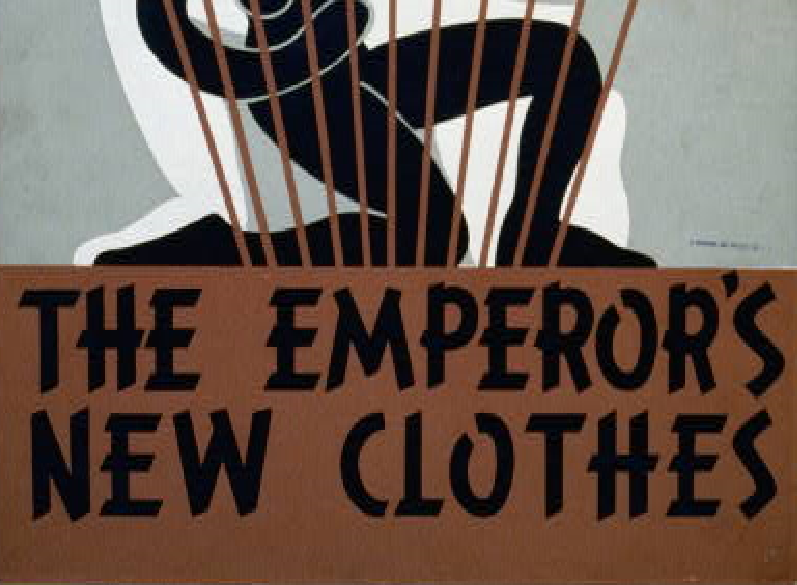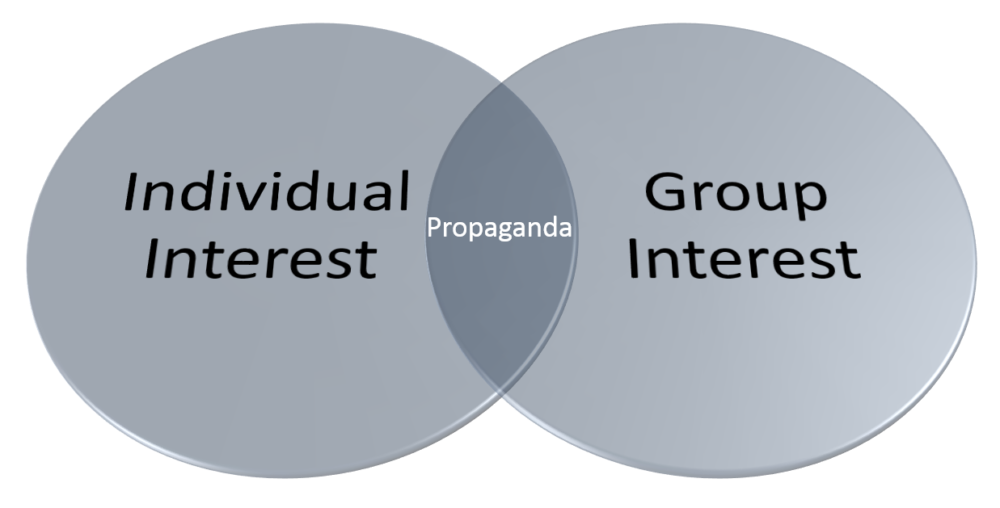If “every media input that is consumed through the senses is propaganda” and “rhetorical persuasion is the algorithm of propaganda“, then there must be a system in the environment which brokers these two ideas together. For this, incidentally, the Britannica Kids Encyclopedia[1] provides additional context to the explanation of propaganda, which reads:
“All propaganda is a systematic effort to persuade. Thus the issue is not the truth or falsehood of what is said. The propagandist gives a one-sided message, emphasizing the good points of one position and the bad points of another position.”
A systematic effort to persuade? Alright, hold your pampers. Before thinking you already have the answer to Final Jeopardy, you may have only triggered a predefined response and elicited a biased conclusion. Depending on whence the propaganda came, you might be thinking: “it’s the lying Republicans and their FOX News”, “it’s those do-nothing-Democrats and their government checks”, or maybe just waving a fist in the air and exclaiming “Capitalism!”. These examples, of course, are nothing more than reductive claims which provide a shorthand explanation to project blame and excuse problems onto another group. More on that later.
The system which allows propaganda, both agreeable or disagreeable, is not a system that actually exists in the external environment.
The system is inside of us
Cold War era social science has given us many fun and exotic ways to manipulate the human brain. The 1950’s brought us cool stuff like MK-Ultra experiments, the CIA program which continued the WWII-era work on subduing and controlling human minds. The early 1960’s brought us decisive tools like Inoculation Theory, which is the idea that introducing counter-arguments of a propaganda in advance can work like an inoculation against its ever ensuing counter-propaganda.
There was also a confusing new concept. This concept was in an effort to differentiate the Russian environment as different from the American’s, because the Russians are lying liars that just lie in their world of lying lies… and they called it “vranyo”[2].
Vranyo was introduced in an article published in the journal, “Problems with Communism”[2-47], in 1962. The author, Ronald Hingley, credits much of the evidence for this concept to a 90-year-old essay written by Fyodor Dostoevsky back in 1873. The essay is titled “Something about lying“, but was printed differently in the journal as “A Word or Two about Vranyo“, from which is quoted:
“Not long ago I was suddenly struck by the thought that among our Russian intellectual classes the existence of a non-liar is an impossibility. The reason for this is that in Russia even completely honest people can lie. I am convinced that in other nations, for the great majority, it is only scoundrels who lie; they lie for practical advantage, i.e. with directly criminal aims.”
Self-serving translations of the original essay title aside, Hingley’s other mistake is using, as his supporting rhetorical argument, the suggestion that Dostoevsky is implicating the entire Russian people as liars. He wasn’t. He was referring to a very specific group.
Hingley’s propaganda could have explained that the primary difference between the cultures was largely along the guilt–shame–fear spectrum of cultures, or how best we are manipulated and ultimately motivated by information. The general consensus of the time being that Americans respond more to guilt tactics and the Russians more to shame. These tactics are often exploited when used at the intersect where individual and group interest converge, previously discussed.
Hingley just calls all Russians liars to help create the shorthand explanation as to why the Russians are so susceptible to what Americans are told is simply propaganda: You see, it’s simple: Russians are just addicted to lying.
Never do we get the whole story
Dostoevsky was very specific in his essay about who the main culprits of this needless and shame-free lying phenomenon were. He specifically called out intellectuals; the educated class; liberals. The class of people that in 1873 Russia, in his view, shouldn’t have needed to lie because they already had better access to resources.
Dostoevsky continues in “Something about lying”:
“In fact, people have finally reached the point where all those things the human mind is forever and ever lying to itself about are much more understandable than the truth itself; and this is the case all over the world. The truth can lie on the table right in front of people for a hundred years but they won’t pick it up; they go chasing after fabrications precisely because they consider truth to be fantastic and utopian.”[3-271]
“There is a point on which any Russian person of the educated category, when appearing in society or in public, is terribly exacting and will not yield an inch… This point is intellect, the desire to appear more clever than he is and – this is remarkable it is certainly not a desire to seem cleverer than everybody else or even cleverer than anyone in particular but only not to be stupider than anyone else.”[3-273]
“Here there arises a phenomenon that exists only in the soul of the Russian educated classes: in that soul, as soon as it finds itself in public, not only is there no doubt of its own intelligence but there is not even any doubt of its own complete erudition*, if the matter comes to erudition*.”[3-274]
*erudition. n. showing knowledge or learnedness.
“One can state positively that every windbag with relatively decent manners (our public, alas, still has a prejudiced weakness for decent manners despite the education that is being spread further and further through feuilletons**) can gain the upper hand and convince his listeners of whatever he pleases, earning their gratitude and departing with deep respect for himself. The one necessary condition, of course, is that he be a liberal; that goes without saying.”[3-276]
**feuilletons. n. newspaper or magazine material designed to entertain the general reader.
Our system of trust is a system of belief, which are both systems of the mind
Hingley does explain, as does Dostoevsky, that historically the “vranyo” was associated with “white-lies”, “fibs”, or “lies for good”. Maybe an embellished story to liven up the listener, an exaggeration to please a group, or something completely made up for personal attention. That’s the way it was for years. Twenty-first century vranyo however, like propaganda, has gone through some changes. This Cold War era relic has gotten itself a makeover: an analog to digital conversion, if you will.
“Perhaps it’s part of the same old game, vranyo“, writes Elena Gorokhova in her 2010 memoir about growing up in the former Soviet Union, “[t]he rules are simple: they lie to us, we know they’re lying, they know we know they’re lying but they keep lying anyway, and we keep pretending to believe them“.
Vranyo in this modern way sounds like a liberal in America describing how they think a conservative consumes media. Vranyo in this way sounds like a conservative in America describing the effects of a liberal media bias. It sounds like how the media still views Russia. Regardless, as the communications landscape becomes more and more centralized, more and more polarized, we can expect to see only the appearance of objectivity more and more. And it’s through this appearance that we capitulate our trust.
It’s our flawed trust system which makes us vulnerable
Civil society requires trust. Our interconnected global world is built around networks of trust. Trust not breaking down is the thing which protects that world against descending into lawless anarchy.[4] Trust is that important. But who do we trust? And why?
Some of the highest trust we give in top-down society is to the educated. The credentialed class. The winners. The educated are most often used as an appeal to authority by marketers, advertisers and information brokers to sell products, people, and ideas to the public without the use of physical coercion. And no one personifies the educated in the eyes of public opinion more than the holder of a doctorate degree. It doesn’t matter in what discipline. In fact, maybe it doesn’t even matter if it’s real. If given the trust, they can pretty much sell anything and get away with anything. Even if we think it’s bullshit. And we let them do it.
A little trust in vranyo is better than no trust at all.
That’s next.
NOTES:
[1] “Propaganda.” kids.britannica.com Encyclopedia, Britannica Kids, https://kids.britannica.com/students/article/propaganda/276549#:~:text=A%20message%20that%20is%20intended,be%20delivered%20in%20many%20ways. Accessed 4 Nov. 2022.
[2]“That’s No Lie, Comrade”, Ronald Hingley, Problems with Communism, April 1962, Vol 11, No. 2 (1962), pp. 47-55
[3]Dostoevsky, F. (1993). Translated by Lantz, K. A Writer’s Diary: Volume One 1873-1876. Northwestern University Press.
[4]Jasinski, Michael P (2011). Social Trust, Anarchy, and International Conflict. Palgrave Macmillian.





